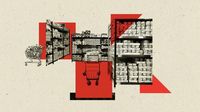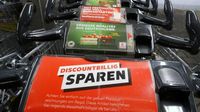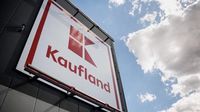The German supermarket chain Kaufland is facing significant scrutiny following alarming revelations regarding hygiene violations in several of its stores. Reports by the news magazine Stern and broadcaster RTL's investigative program Team Wallraff uncovered serious deficiencies across 50 Kaufland locations, leading to immediate management changes in two specific stores.
According to a report published on April 3, 2025, by the Saarbrücker Zeitung, instances of mold, pest infestations, and unsafe food handling practices were documented in various branches, including those in Bad Tölz, Upper Bavaria, and Homburg, Saarland. Kaufland has responded by replacing the management in these locations, emphasizing that the findings do not align with the company’s stringent food safety and hygiene standards.
Investigators from Stern and RTL conducted undercover operations in 50 stores, revealing that in 48 of them, serious hygiene violations were present. Issues included moldy refrigerators, expired products being relabeled and sold, and even mouse droppings found in food storage areas. In Bad Tölz, employees were reportedly caught manipulating expiration dates on fresh goods.
A Kaufland spokeswoman acknowledged the reports, stating, "The representations in the report do not correspond in any way to our strict guidelines regarding food handling and hygiene." She added that the company had already initiated measures to rectify the deficiencies before the report was published.
In Homburg, the investigation highlighted a severe pest infestation, with a spokeswoman admitting to a "pest infestation" in that branch. The local environmental ministry has confirmed that an administrative offense procedure is ongoing regarding the store's conditions.
Additionally, a separate investigation in October 2024 by the same team involved sampling chicken products from ten stores across various federal states, revealing that 15 out of 30 samples were contaminated with campylobacter, a bacterium that can cause severe gastrointestinal illness. Alarmingly, 11 of the samples contained antibiotic-resistant pathogens, raising concerns about the potential impact on human health.
Reinhild Benning, an agricultural expert from the German Environmental Aid (DUH), described the findings as "alarming," emphasizing that the high levels of contamination in Kaufland's meat products are "not tolerable" and pose a risk to public health. She stated, "From my perspective, this level of contamination is completely unacceptable."
In response to the findings, Kaufland has committed to a comprehensive review of its operations, stating that a significant portion of the deficiencies has already been addressed. The company operates over 770 stores and employs more than 90,000 people across Germany, and it is a subsidiary of the Schwarz Group, which also owns Lidl.
The ongoing scrutiny has led to a public outcry, with many customers expressing their disgust on social media. Comments like "Mold in the shelf and on the cheese. Expired shrimp are relabeled and sold again. What a damage to Kaufland's image" have surfaced, indicating a loss of trust among consumers.
Furthermore, a night vision camera installed in the Homburg location captured 48 mouse movements in just six hours, illustrating the extent of the infestation. Employees have reported that the pressure to meet sales targets has compromised their ability to maintain hygiene standards, with inadequate cleaning staff being a recurring issue.
In light of these findings, Kaufland has announced plans to modernize the Homburg store starting in May 2025 to enhance hygiene and pest control measures. The company has stated that they are in close coordination with the relevant food safety authorities and experts to ensure compliance with health regulations.
As the fallout from these revelations continues, Kaufland is facing a challenging road ahead to restore its reputation and ensure the safety of its products. The company has reiterated its commitment to food safety, stating that the quality of products and customer protection are of "uncompromising priority." Regular training for employees and defined processes for food handling are part of their ongoing efforts to improve standards.
Despite these assurances, the damage to Kaufland's image is palpable, with many customers vowing to reconsider their shopping habits. As the investigation continues to unfold, the company is under pressure to demonstrate that it can uphold the safety and quality expectations of its consumers.
In a related note, RTL will broadcast a documentary titled "Mold. Mice. Work Pressure. Undercover at Kaufland" on April 3, 2025, shedding further light on the investigative findings and the conditions within the stores.





